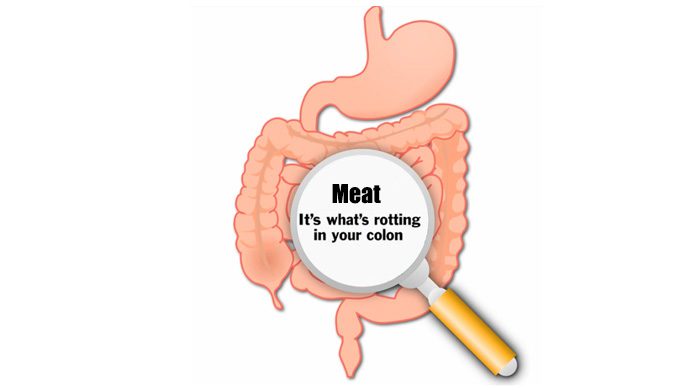Meat’s Harmful Hydrogen Sulfide Byproduct Vs Plant’s Helpful Butyrate Byproduct

Meat And Plants React Differently In The Body
Meat acidifies the body and plants generally alkalize the body. There are many other reactions that meat and plants cause in the body. The consumption of meat and plant foods affect the development of flora or bacteria in the digestive tract differently.
Researchers at one time thought the small intestine fully digested meat. They now understand that up to 12 grams of meat can escape digestion in people who consume a Western diet. The meat will remain undigested travelling through the small intestine in and make its way to the colon.[1]
Bad bacteria in the colon ferments the undigested meat and produces bad byproducts including hydrogen sulfide. This process is called putrefaction and this putrefied waste destroys the health of the digestive tract and body.
In contrast, good bacteria consume plant’s fiber and resistant starch travel to the colon. The good bacteria produce a short-chain fatty acid byproduct called butyrate. This short-chain fatty acid is used as a fuel source by the cells of the colon, strengthening and protecting it from cancer and inflammatory bowel disease.
Meat and its Production of the Harmful Hydrogen Sulfide
Bad bacteria ferments undigested meat that ends up in colon. The bacteria produces hydrogen sulfide which blocks the cells of the colon from using the protective short-chain fatty acids.[2]
The Standard American Diet (SAD) has 5-6 times more sulfur, which the bacteria use to make hydrogen sulfide.
Dr. Greger: Bowel Wars
Learn about health supporting foods on the Dr. Sebi Nutritional Guide »
Sources:
[1] The effect of meat protein and dietary fiber on colonic function and metabolism. II. Bacterial metabolites in feces and urine.
[2] Influence of dietary factors on the clinical course of ulcerative colitis: a prospective cohort study.






